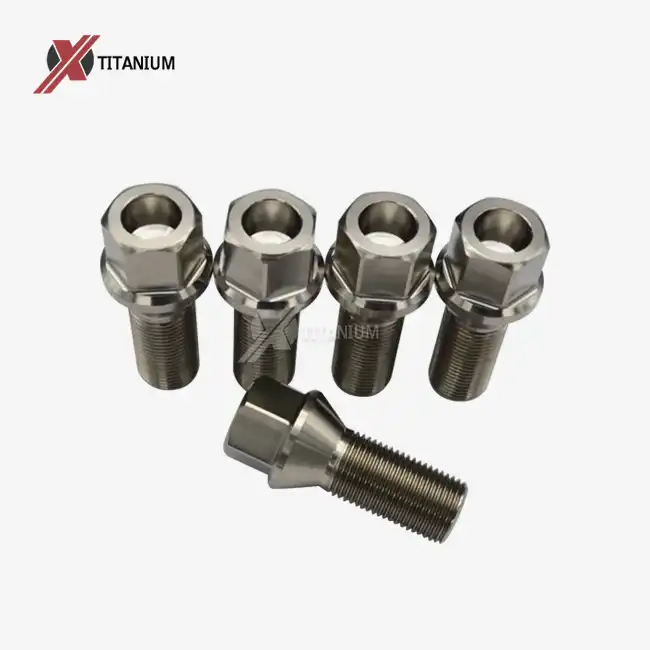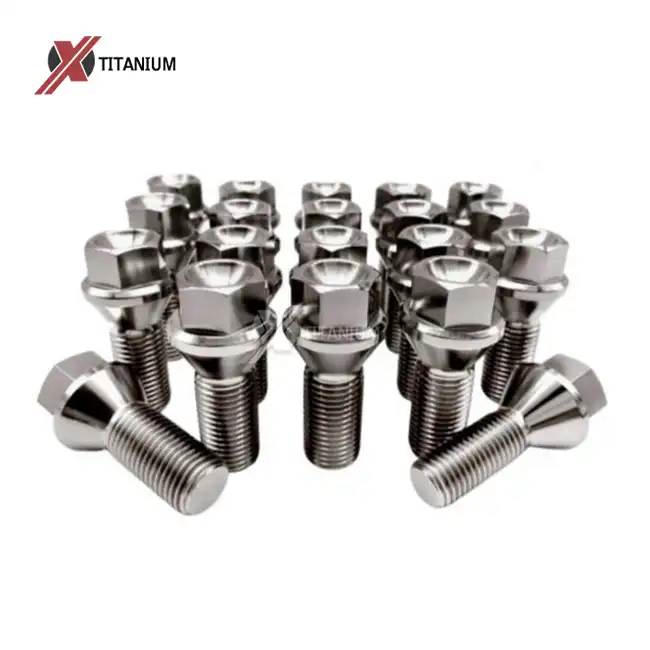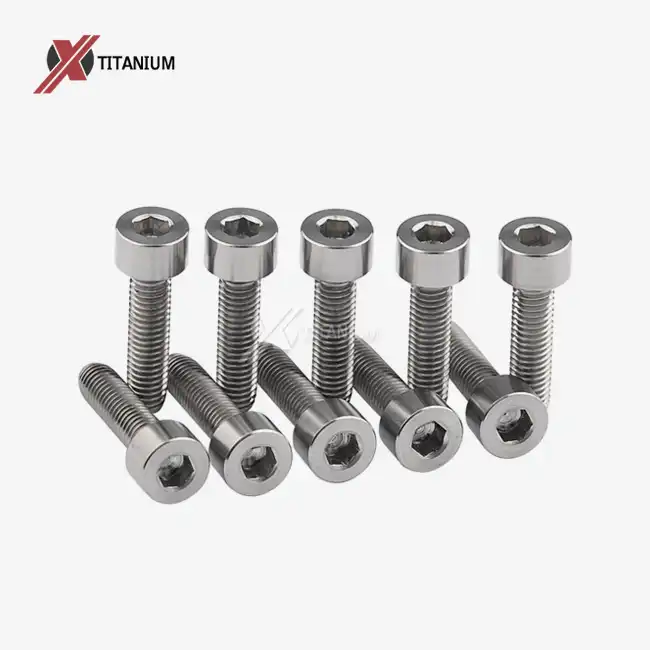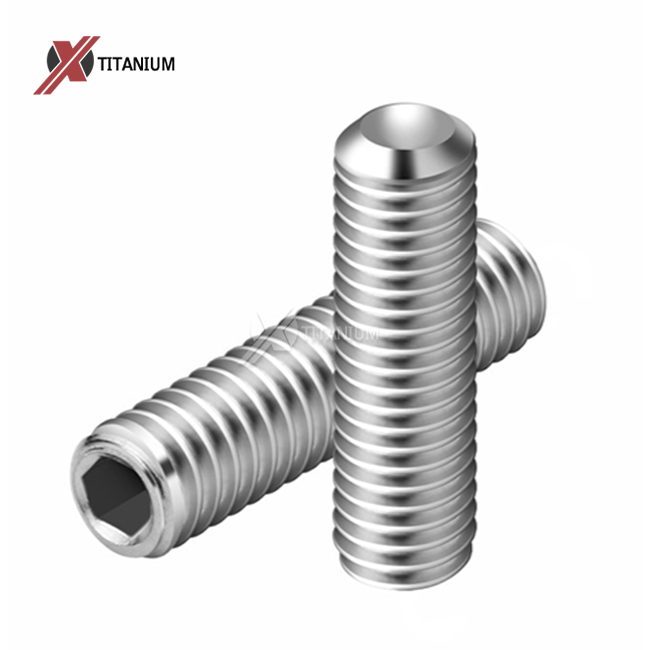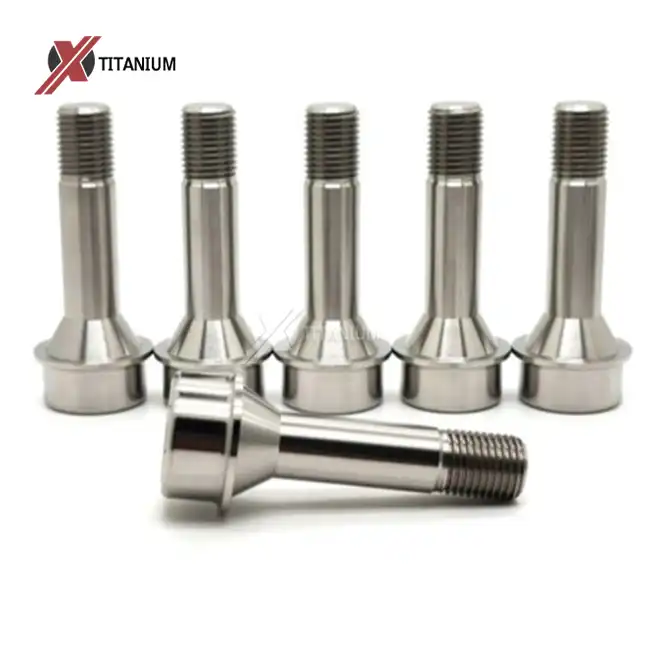Introducing the Advantages of Titanium Wheel Bolts
The Unique Properties of Titanium in Automotive Applications
Titanium's exceptional properties make it an ideal material for automotive applications, especially for critical components like wheel bolts. The metal boasts an impressive strength-to-weight ratio, surpassing that of steel while weighing significantly less. This characteristic alone makes titanium wheel bolts a coveted upgrade for performance enthusiasts and racing teams.
Moreover, titanium's natural corrosion resistance adds another layer of appeal. Unlike steel bolts that may rust over time, titanium wheel bolts maintain their integrity even when exposed to harsh environmental conditions. This durability translates to longer-lasting parts and reduced maintenance needs, which is particularly valuable in high-stress automotive applications.
Weight Reduction: A Key Factor in Performance Enhancement
The automotive world lives by the mantra "lighter is better," and titanium wheel bolts embody this principle perfectly. By replacing standard steel bolts with titanium alternatives, car owners can achieve a noticeable reduction in unsprung weight. This weight savings, while seemingly small, can have a cascading effect on overall vehicle performance.
Reduced unsprung weight leads to improved suspension response, allowing the wheels to react more quickly to road irregularities. This enhanced responsiveness translates to better handling, increased traction, and a more connected driving experience. Furthermore, the cumulative weight reduction across all four wheels can contribute to improved acceleration and braking performance, giving drivers a tangible edge both on the street and on the track.
Aesthetic Appeal: Form Meets Function
While performance is paramount, the aesthetic appeal of titanium wheel bolts shouldn't be overlooked. Many manufacturers offer these bolts in a variety of finishes and colors, allowing car enthusiasts to add a touch of personalization to their vehicles. From the subtle elegance of brushed titanium to vibrant anodized hues, these bolts can serve as both a functional upgrade and a stylish accent.
The visual distinction of titanium wheel bolts often catches the eye of fellow enthusiasts, serving as a conversation starter at car meets and showcasing the owner's commitment to quality and performance. This blend of form and function epitomizes the ethos of many car modification subcultures, where every detail matters and contributes to the overall vision of the vehicle.
The Technology Behind Titanium Wheel Bolts
Manufacturing Process: Precision Engineering at Its Finest
The production of titanium wheel bolts is a testament to modern manufacturing capabilities. The process typically begins with high-grade titanium alloy, often Ti-6Al-4V (Grade 5), known for its excellent balance of strength, machinability, and corrosion resistance. This alloy is carefully selected to meet the rigorous demands of automotive applications.
The manufacturing process often involves advanced CNC machining techniques. These computer-controlled systems ensure that each bolt is crafted to exact specifications, maintaining tight tolerances crucial for proper fitment and performance. The precision of this process is paramount, as even minor deviations could compromise the bolt's integrity and, consequently, the safety of the wheel assembly.
Following the initial shaping, many titanium wheel bolts undergo additional treatments to enhance their properties further. These may include heat treatments to optimize strength and durability, or surface treatments like anodizing to improve corrosion resistance and add color options. The result is a product that not only meets but often exceeds industry standards for strength and reliability.
Quality Control: Ensuring Safety and Performance
Given the critical role wheel bolts play in vehicle safety, quality control measures for titanium wheel bolts are stringent and comprehensive. Reputable manufacturers employ a battery of tests to ensure each bolt meets or exceeds specified performance criteria.
These tests often include tensile strength assessments to verify the bolt's ability to withstand extreme forces, fatigue testing to simulate long-term use under varying conditions, and dimensional checks to ensure perfect fitment. Additionally, many manufacturers conduct metallurgical analyses to confirm the material composition and structure, ensuring the titanium alloy meets the required specifications.
Some high-end producers even utilize advanced non-destructive testing methods, such as ultrasonic or X-ray inspections, to detect any internal flaws that might compromise the bolt's integrity. This meticulous attention to quality control underscores the commitment to safety that underlies the production of titanium wheel bolts.
Compatibility and Installation Considerations
While titanium wheel bolts offer numerous advantages, proper installation is crucial to realize these benefits fully. Most titanium bolts are designed as direct replacements for OEM (Original Equipment Manufacturer) bolts, but it's essential to verify compatibility with your specific vehicle model and wheel type.
Installation typically requires specialized tools, including a torque wrench calibrated for the specific torque requirements of titanium bolts. It's worth noting that titanium has different frictional properties compared to steel, which can affect the proper tightening procedure. Many manufacturers provide detailed installation instructions, and it's crucial to follow these guidelines precisely to ensure optimal performance and safety.
Furthermore, some high-performance applications may require periodic re-torquing of the bolts, especially after initial installation or in racing scenarios where extreme forces are at play. This maintenance aspect underscores the importance of viewing titanium wheel bolts not just as a one-time upgrade, but as a component that requires ongoing attention to maintain its performance benefits.
Real-World Applications and Future Trends
Case Studies: Success Stories from the Track to the Street
The adoption of titanium wheel bolts has led to notable improvements in various automotive sectors. In professional racing, where every gram counts, teams have reported measurable gains in lap times after switching to titanium fasteners. One prominent European racing team documented a reduction in unsprung weight of nearly 2 kilograms across all four wheels, contributing to improved cornering speeds and acceleration out of turns.
In the realm of high-performance street cars, enthusiasts have noted enhanced driving dynamics after upgrading to titanium wheel bolts. A case study involving a modified sports sedan showed a 0.2-second improvement in 0-60 mph acceleration times, attributed in part to the reduced rotational mass from the titanium bolt upgrade. While such gains might seem marginal, they represent significant improvements in the world of performance tuning.
Even in less extreme applications, the benefits of titanium wheel bolts are being recognized. Luxury car manufacturers have begun offering titanium fasteners as factory options or dealer-installed upgrades, touting their corrosion resistance and aesthetic appeal as selling points for discerning customers.
Environmental Impact: Sustainability in Automotive Engineering
The use of titanium wheel bolts also intersects with growing concerns about environmental sustainability in the automotive industry. While the initial energy input for titanium production is higher compared to steel, the long-term benefits can offset this initial cost.
Titanium's exceptional durability means these bolts often outlast the vehicle itself, reducing the need for replacement and the associated resource consumption. Additionally, the weight reduction, however small, contributes to improved fuel efficiency over the life of the vehicle. In electric vehicles, where weight savings directly translate to extended range, the use of titanium components like wheel bolts can have a compounding positive effect on energy efficiency.
Moreover, titanium is 100% recyclable without loss of quality, aligning with circular economy principles. As end-of-life vehicle recycling becomes more sophisticated, the recovery and reuse of titanium components present an opportunity to further reduce the environmental footprint of automotive manufacturing.
Future Innovations: What's Next for Titanium in Automotive Design?
The victory of titanium wheel jolts has impelled encourage inquire about into growing the utilize of titanium in other car applications. Engineers are investigating the potential for titanium in bigger auxiliary components, suspension parts, and indeed motor internals. The challenge lies in adjusting the execution benefits with taken a toll contemplations, as titanium remains altogether more costly than conventional materials like steel or aluminum.
Advancements in fabricating advances, especially in the domain of 3D printing and added substance fabricating, are opening modern conceivable outcomes for titanium in car plan. These advances permit for the creation of complex geometries that were already incomprehensible or unreasonable to machine, possibly driving to indeed lighter and more grounded components.
There's moreover progressing inquire about into titanium combinations particularly custom-made for car utilize. These modern amalgams point to optimize the adjust between quality, weight, and taken a toll, possibly making titanium more open for standard vehicle generation. As these developments proceed to create, we may see titanium move past specialized applications like wheel jolts to ended up a more fundamentally portion of car building over all vehicle portions.
Conclusion
Titanium wheel bolts represent more than just a simple upgrade; they're a gateway to enhanced performance, improved aesthetics, and a glimpse into the future of automotive engineering. As we've explored, these unassuming components offer a range of benefits that extend far beyond their primary function of securing wheels to vehicles. From weight reduction and improved handling to corrosion resistance and aesthetic appeal, titanium wheel bolts embody the convergence of form and function that defines modern automotive design.
As the automotive industry continues to evolve, with an increasing focus on efficiency, performance, and sustainability, the role of advanced materials like titanium is likely to grow. The success of titanium wheel bolts paves the way for broader applications of this remarkable metal in vehicle design, potentially reshaping our expectations of what's possible in automotive engineering.
To learn more about titanium wheel bolts and other innovative titanium products for automotive applications, reach out to the experts at Baoji Chuanglian New Metal Material Co., Ltd. Contact us at info@cltifastener.com or djy6580@aliyun.com for personalized advice and product information. Embrace the future of automotive performance with titanium – your vehicle will thank you.
